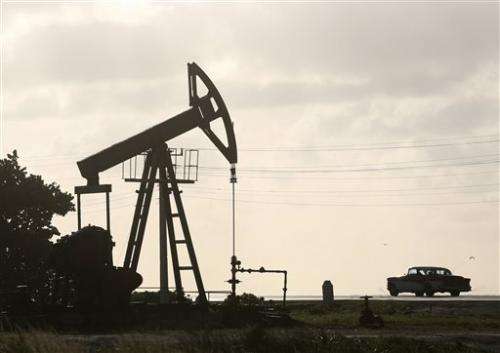Hopes, fears, doubts surround Cuba's oil future

One of the most prolific oil and gas basins on the planet sits just off Cuba's northwest coast, and the thaw in relations with the United States is giving rise to hopes that Cuba can now get in on the action.
It's a prospect welcomed by Cubans desperate for economic growth yet deeply concerning for environmentalists and the tourism industry in the region.
But a Cuban oil boom is unlikely anytime soon even if restrictions on U.S. businesses are relaxed because of low oil prices and far better drilling opportunities elsewhere.
"(Cuba) is not going to be the place where operators come rolling in," says Bob Fryklund, chief strategist for oil and gas exploration and production at the analysis firm IHS.
Although Cuba's oil and gas industry has long been open to foreign investment, the U.S. embargo has denied it some of the world's best deep-water drilling technology and expertise. As a result, Cuba produces just 55,000 barrels of oil per day. About one-third of that is produced by a Canadian firm called Sherritt International.
Cuba needs 155,000 barrels per day, and it fills the gap with oil from Venezuela, part of a trade agreement established under former Venezuelan President Hugo Chavez. By comparison, a single large oil platform in the deep water U.S. Gulf of Mexico can produce 200,000 barrels per day.
The few major exploration projects in Cuba in recent years have had little success. Most recently, the Spanish company Repsol abandoned a yearslong exploration project in 2012 when an offshore exploratory well failed to find much oil.
Fryklund says that U.S. oil services firms, which have been prevented from working in Cuba, could provide technology to operators in Cuba to help increase production somewhat. Also, U.S. refiners could find a new market in Cuba for gasoline and diesel or refining technology. Cuba has been struggling to find a partner to finance an upgrade an expansion of its largest refinery, in Cienfuegos.
But a factor that helped push Cuba to seek closer ties with the United States also could impede major oil exploration there: low oil prices.
A plunge of nearly 50 percent in the global price of oil has crushed the oil-dependent economies of Venezuela and Russia, threatening aid from Cuba's biggest benefactors.
"None of Cuba's friends have the financial capability to throw a safety net or a safety line to Cuba," says Jorge Pinon, former Amoco Oil Latin America president now at the University of Texas. Cuba suffered enormously when foreign aid dried up after the fall of the Soviet Union, and it wants to avoid similar economic pain now that Venezuelan aid is uncertain.
Low oil prices also force drillers to shy away from risky projects because the potential for a big financial return is so much smaller.
Even though Cuba sits relatively close to some of the biggest deep-water oil fields in the Gulf of Mexico, the geology under Cuba's waters is drastically different from that of the rest of the Gulf.
The U.S. Geological Survey estimates there are 4.6 billion barrels of undiscovered oil in Cuba—a substantial but not enormous amount because not all of that oil could possibly be produced. The U.S. Gulf of Mexico contains an estimated 10 times that much.
Also, there are also bigger and better-known fields in Mexico, which recently amended its constitution to allow foreign investment in its oil industry.
Cuba could offer very favorable terms to entice drillers to come, however, and smaller firms willing to take bigger risks may give Cuba a shot.
A major concern for environmentalists and the tourism industry in the region is Cuba's ability to drill at international safety standards, including its response to any spill, according to Bob Graham, who co-chaired the national commission on the Deepwater Horizon oil spill. They fear a spill could quickly spread to ecologically rich and economically important reefs and beaches in nearby Florida and throughout the Caribbean.
Under the U.S. embargo of Cuba, which remains in place, anything comprised of more than 10 percent U.S. parts cannot be sold to Cuba or a Cuban contractor. That covers almost all modern drilling systems, Graham says. "It's going to require some modification of the embargo to allow state-of-the-art equipment to be used for Cuban drilling."
The U.S. National Oceanic and Atmospheric Association has been working with the U.S. Coast Guard and other state and federal agencies to study the possible threats posed by offshore oil drilling near the Florida Straits and the Bahamas, says NOAA spokesman Ben Sherman. The agency also shares technical expertise on oil spill planning and response with Caribbean nations, including Cuba, Sherman says.
When William Reilly, Graham's co-chair on Deepwater Horizon spill commission and head of the EPA under President George H. W. Bush, presented the commission's final report to Cuban regulators in Havana, he found they had already made plans to follow the commission's recommendations with the resources they had. That included sending staff to Canada to learn English to improve communications in the event of an oil spill.
Reilly says Cuban officials had high hopes for their oil industry. A delegation had a telescope trained on an offshore rig that was exploring for oil and gas, though it could be seen without a telescope. "It was like a beacon of economic hope to Cubans in Havana," he says.
© 2014 The Associated Press. All rights reserved.


















